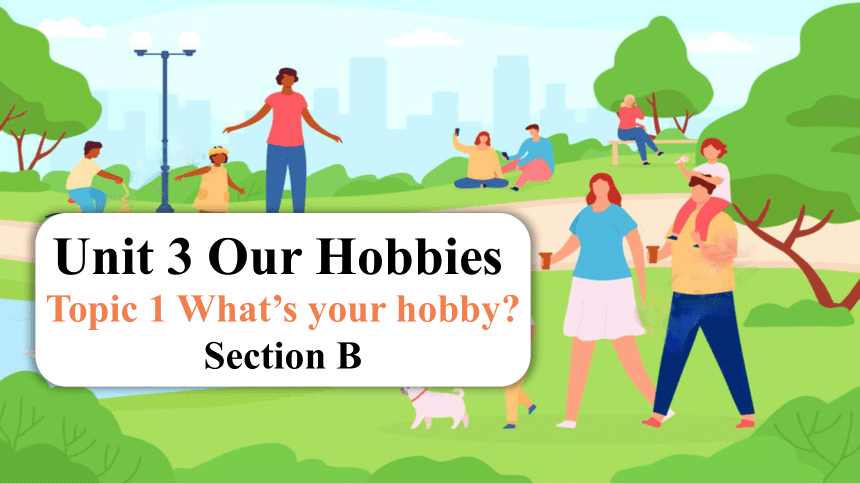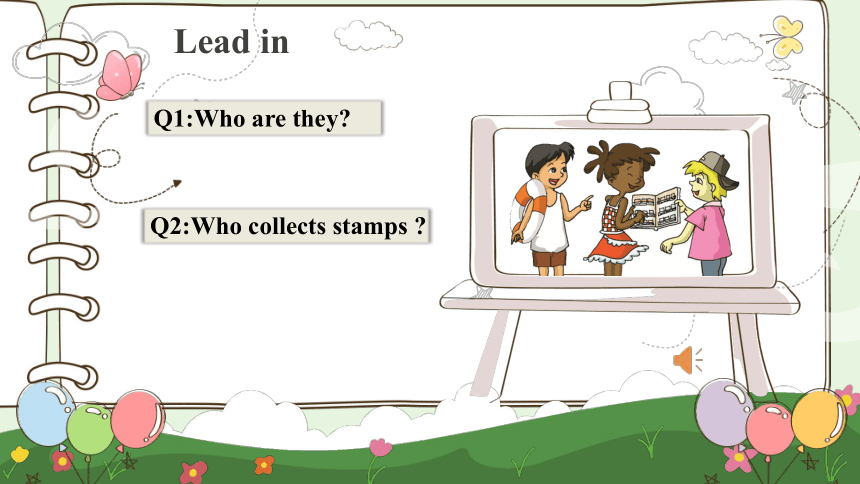Unit 3 Topic 1 What's your hobby?Section B 课件 2023-2024学年仁爱版英语八年级上册 (共19张PPT)
文档属性
| 名称 | Unit 3 Topic 1 What's your hobby?Section B 课件 2023-2024学年仁爱版英语八年级上册 (共19张PPT) |

|
|
| 格式 | pptx | ||
| 文件大小 | 22.1MB | ||
| 资源类型 | 教案 | ||
| 版本资源 | 仁爱科普版 | ||
| 科目 | 英语 | ||
| 更新时间 | 2023-10-20 21:32:42 | ||
图片预览







文档简介
(共19张PPT)
Unit 3 Our Hobbies
Topic 1 What’s your hobby
Section B
Review
Q: What’s his/her hobby
be interested in
be fond of
enjoy
prefer
love
be fond of
prefer
Lead in
Q1:Who are they
Q2:Who collects stamps
Listen to 1a and circle True or False.
Maria only collects Chinese stamps.
Michael’s favorite hobby is playing
baseball.
3. Kangkang is fond of swimming.
4. We can learn a lot about history and people from stamps.
True False
True False
True False
True False
While-listening
Find out the following phrases
你拿着什么?
集邮 (名)
多美的邮票!
它一定很有趣!
当然了。
从…中学习
过去常常做某事
康康来了。
What are you carrying
stamp collection
What beautiful stamps!
It must be great fun.
It certainly is.
learn …from….
used to do sth.
Here comes Kangkang.
While-listening
What can you learn from the stamp collection
We can learn … from stamps.
Some of them are of great value.
flowers
people
animals
places of interest
special events
While-listening
Read 1a and fill in the blanks.
Maria likes ________ stamps and she ________ them when she was in Cuba. She thinks we can learn a lot about _______ and ______ from stamps. And now she has many beautiful Chinese stamps. Michael _________ collect baseball cards when he was in America. Now ________ basketball is his hobby. Kangkang is interested in __________ . The three children have different _________ .
collecting
collected
people
history
used to
playing
swimming
hobbies
Language points
What are you carrying
bring 带来 (由远及近)
take .. to..带走 (由近及远)
carry 拿,携带(无方向性)
Language points
1、What beautiful stamps!多么漂亮的邮票啊!
此句为感叹句。感叹句是表示喜怒哀乐等强烈感情的句子。
常用what和how引导。What 修饰名词,how修饰形容词或副词。
多好的女孩!
多重的箱子!
他工作多努力啊!
What a kind girl she is !
How heavy the box is !
How hard he works !
感叹句结构:
What+a/an+(形容词)+单数可数名词+主语+谓语。
What+(形容词)+名词复数、不可数名词+主语+谓语。
How+ adj. +主+谓!
I used to collect baseball cards.
我过去常常收集棒球卡。
used to do sth.
过去常常做某事(现在不做了)
e.g. 我过去常常骑自行车去上班。
I __________ to work by bike.
used to 的各种句式:
否定句: sb. didn’t use to do sth.
一般疑问句: Did sb. use to do sth. .
used to go
Language points
3 Talk about your hobbies in groups with the following expressions.
Post-listening
I used to enjoy pop music, but now I don’t like it. I love playing sports.
I didn’t use to go shopping, but now I like it.
keep pets listen to music
watch TV play computer games
go shopping play soccer
2 Listen to the conversation and check the collections you hear.
telephone cards
model planes
dolls
photos of famous stars
stamps
coins
★
★
★
★
While-listening
Let’s dub!
Retell the passage.
Michael: Hi, Maria! What are you carrying
Maria: It's my stamp collection._________________
Michael: Wow! ________________! Are they all from China
Maria: ______. I collected some of them from Cuba. But now I also have a lot of beautiful stamps from China.
Michael:_________________.
Maria: It certainly is. We can_____ a lot about history and people_____ stamps. What hobbies did you ______have
Michael: I_____ collect baseball cards. But now_____basketball.
Post-listening
Read the conversation in pairs.
(________Kangkang)
Kangkang: Hi,Maria! Hi, Michael! ________________
Michael: Hi, Kangkang! We are looking at Maria's ________. Where are you going
Kangkang: I'm going swimming. It's my ________.
Post-listening
Make a survey about hobbies in groups.
Complete the table and then report it to the class..
Post-listening
Exercise
4a Read the following words and pay attention to the sounds of the underlined parts. Find the rules and add more words to each group .
/s/: stamps comics desks
/z/: stones dolls coins
/ts/: pets kites sports
/dz/: friends beds cards
Exercise
4b Listen and pay attention to the stress.
Then read after the taps and imitate.
’hobbies ’certainly ’favorite ’interested
2. be ’fond of ’listen to ’music ’fly ’kites
’model ’planes
3. I ’didn’t use to ’keep ’pets, but ’now I ‘love it.
4. I ’used to ’enjoy ’swimming, but ’now I ’don’t like it.
Stress occurs in words, phrases and sentences.
Unit 3 Our Hobbies
Topic 1 What’s your hobby
Section B
Review
Q: What’s his/her hobby
be interested in
be fond of
enjoy
prefer
love
be fond of
prefer
Lead in
Q1:Who are they
Q2:Who collects stamps
Listen to 1a and circle True or False.
Maria only collects Chinese stamps.
Michael’s favorite hobby is playing
baseball.
3. Kangkang is fond of swimming.
4. We can learn a lot about history and people from stamps.
True False
True False
True False
True False
While-listening
Find out the following phrases
你拿着什么?
集邮 (名)
多美的邮票!
它一定很有趣!
当然了。
从…中学习
过去常常做某事
康康来了。
What are you carrying
stamp collection
What beautiful stamps!
It must be great fun.
It certainly is.
learn …from….
used to do sth.
Here comes Kangkang.
While-listening
What can you learn from the stamp collection
We can learn … from stamps.
Some of them are of great value.
flowers
people
animals
places of interest
special events
While-listening
Read 1a and fill in the blanks.
Maria likes ________ stamps and she ________ them when she was in Cuba. She thinks we can learn a lot about _______ and ______ from stamps. And now she has many beautiful Chinese stamps. Michael _________ collect baseball cards when he was in America. Now ________ basketball is his hobby. Kangkang is interested in __________ . The three children have different _________ .
collecting
collected
people
history
used to
playing
swimming
hobbies
Language points
What are you carrying
bring 带来 (由远及近)
take .. to..带走 (由近及远)
carry 拿,携带(无方向性)
Language points
1、What beautiful stamps!多么漂亮的邮票啊!
此句为感叹句。感叹句是表示喜怒哀乐等强烈感情的句子。
常用what和how引导。What 修饰名词,how修饰形容词或副词。
多好的女孩!
多重的箱子!
他工作多努力啊!
What a kind girl she is !
How heavy the box is !
How hard he works !
感叹句结构:
What+a/an+(形容词)+单数可数名词+主语+谓语。
What+(形容词)+名词复数、不可数名词+主语+谓语。
How+ adj. +主+谓!
I used to collect baseball cards.
我过去常常收集棒球卡。
used to do sth.
过去常常做某事(现在不做了)
e.g. 我过去常常骑自行车去上班。
I __________ to work by bike.
used to 的各种句式:
否定句: sb. didn’t use to do sth.
一般疑问句: Did sb. use to do sth. .
used to go
Language points
3 Talk about your hobbies in groups with the following expressions.
Post-listening
I used to enjoy pop music, but now I don’t like it. I love playing sports.
I didn’t use to go shopping, but now I like it.
keep pets listen to music
watch TV play computer games
go shopping play soccer
2 Listen to the conversation and check the collections you hear.
telephone cards
model planes
dolls
photos of famous stars
stamps
coins
★
★
★
★
While-listening
Let’s dub!
Retell the passage.
Michael: Hi, Maria! What are you carrying
Maria: It's my stamp collection._________________
Michael: Wow! ________________! Are they all from China
Maria: ______. I collected some of them from Cuba. But now I also have a lot of beautiful stamps from China.
Michael:_________________.
Maria: It certainly is. We can_____ a lot about history and people_____ stamps. What hobbies did you ______have
Michael: I_____ collect baseball cards. But now_____basketball.
Post-listening
Read the conversation in pairs.
(________Kangkang)
Kangkang: Hi,Maria! Hi, Michael! ________________
Michael: Hi, Kangkang! We are looking at Maria's ________. Where are you going
Kangkang: I'm going swimming. It's my ________.
Post-listening
Make a survey about hobbies in groups.
Complete the table and then report it to the class..
Post-listening
Exercise
4a Read the following words and pay attention to the sounds of the underlined parts. Find the rules and add more words to each group .
/s/: stamps comics desks
/z/: stones dolls coins
/ts/: pets kites sports
/dz/: friends beds cards
Exercise
4b Listen and pay attention to the stress.
Then read after the taps and imitate.
’hobbies ’certainly ’favorite ’interested
2. be ’fond of ’listen to ’music ’fly ’kites
’model ’planes
3. I ’didn’t use to ’keep ’pets, but ’now I ‘love it.
4. I ’used to ’enjoy ’swimming, but ’now I ’don’t like it.
Stress occurs in words, phrases and sentences.
同课章节目录
- Unit 1 Playing Sports
- Topic 1 I'm going to play basketball.
- Topic 2 I'll kick you the ball again.
- Topic 3 The school sports meet is coming.
- Unit 2 Keeping Healthy
- Topic 1 You should brush your teeth twice a day.
- Topic 2 I must ask him to give up smoking.
- Topic 3 Must we exercise to prevent the flu?
- Unit 3 Our Hobbies
- Topic 1 What's your hobby?
- Topic 2 What sweet music!
- Topic 3 What were you doing at this time yesterday
- Unit 4 Our World
- Topic 1 What's the strongest animal on the farm?
- Topic 2 How can we protect ourselves from the eart
- Topic 3 The Internet makes the world smaller.
